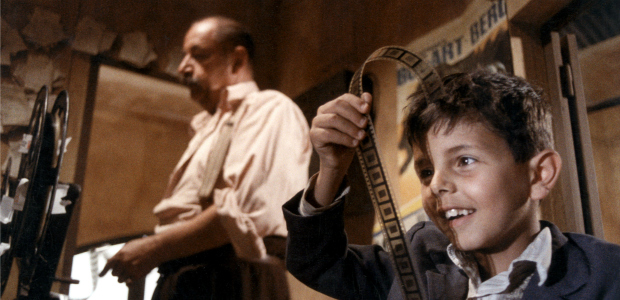Cinema Paradiso
An enchanting trip of nostalgia that is timeless in its appeal.
Plot summary
Cinema Paradiso tells the story of Salvatore, a successful film director, returning home for the funeral of Alfredo, his old friend who was the projectionist at the local cinema throughout his childhood. Soon memories of his first love affair with the beautiful Elena and all the high and lows that shaped his life come flooding back, as Salvatore reconnects with the community he left 30 years earlier.

If your spirits need lifting through the cold and dark winter months, the beautifully saturated tones of Guisepe Tornatore’s Cinema Paradiso are just the ticket to warm the cockles. This classic film, made in 1988 and fully restored to celebrate its 25th anniversary, is Tornatore’s love letter to cinema, and is imbued with the nostalgia for the Italy of bygone days.
Based in a small Sicilian town, Cinema Paradiso explores how film can bind a community, as witnessed by the film’s protagonist, Salvatore, who works in the local cinema during his formative years. Played by three different actors throughout the different stages of his life, Salvatore experiences firsthand the impact his local cinema has on the small community, creating a microcosm of society where the villagers laugh, love, cry and even (for one unlucky customer) take their last breath. As what could be called the filmic version of a ‘Bildungsroman’ (a coming of age story), the three different stages of the protagonist’s life are played out in the Cinema Paradiso- first as the young ‘Toto’ (played by the irrepressibly impish Salvatore Cascio), as a young man (Marco Leonardi) and finally as an adult (Nino Terzo), who returns to visit his home town after 30 years away.
The film begins as a mature Salvatore hears of the death of his mentor and father figure, Alfredo (Phillipe Noiret), and this is what precipitates his return to the town of Giancaldo. The narrative then skips back to the young Toto (Salvatore), who relentlessly pursues Alfredo to teach him his trade of cinematic projection. Toto is obsessed with film, even collecting snippets of the celluloid itself, after it has been cut from the reel following the local priest’s entertaining censure of the golden age of cinema’s kissing scenes. This leaves the local villagers in uproar as they view the censored versions of such classics as The Lower Depths (1936), and contributes much to the humour and pathos of the film itself. Although the audience of the Cinema Paradiso can enjoy films that are very much separate to their daily existence, the presence of the Second World War looms in the background. Newsreel footage intersperses laughs from comic greats such as Laurel and Hardy, and it is from one of these announcements that Toto learns of his father’s death in action. Following this, Alberto becomes more of a father figure to the young Toto than before, and the dramatic moment where the cinema catches fire cements their special bond, and makes them even more reliant upon each other, in various ways. Young Toto grows into adolescent Toto, and takes over from Alfredo as the Paradiso’s projectionist , learning not only the art of cinema but the art of love as he meets the beautiful Elena (Agnese Nano). The audience witness the changing face of film through the many reels that Toto shows at the cinema- the erotic awakening of the young boys viewing Bardot in all her glory in And God created Woman (1956) mark a shift in society’s sexual and religious perceptions, and amusingly, Toto uses a confessional booth to woo his love Elena- certainly not its intended purpose! However, as society changes and shifts, so must Toto, and it is Alfredo, in one of the film’s most poignant scenes, that encourages him to leave the small town, and pursue his life, and love of cinema, elsewhere. The moving scene at the end of the film where Toto returns for his mentor’s funeral, and witnesses the destruction of the Paradiso (to make way for a car park) is also representative in the change of cinema viewing in a modern age. The former proprietor of the Paradiso refers to the impact of the recession and how newer viewing methods such as video, drew audiences away from his business, leaving the cinema to fall into disrepair. In the age of internet piracy and online viewing, we must also wonder as to the fate of local cinemas that struggle to stay abreast of the times, and in this way the film makes a very prescient comment as to the future of cinema itself.
Wonderfully shot and beautifully captured, it is no wonder that Cinema Paradiso garnered so much critical acclaim upon it’s release, and as a classic movie, it is an enchanting trip of nostalgia that is timeless in its appeal.











COMMENTS